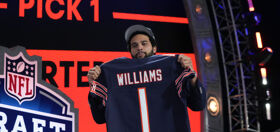
Today the Supreme Court will hear arguments in Hollingsworth v. Perry, which explores the constitutionality of California’s Prop 8—and tomorrow, they Gang of Nine dig into the DOMA-busting Edie Windsor v. U.S. But it’s not the first time the Supremes have weighed in on our rights.
In January we pulled up some case histories to see how the Court has addressed the LGBT community to date. Given the importance of today and tomorrow, we’re re-posting the feature. Hopefully the next time you see it, Number Six will include the case where the Court made a call for marriage equality.
Check back all day for updates on everything from the Supreme Court hearings themselves, to the dozens of vigils, rallies and events planned nationwide
 One, Inc. v. Olesen
One, Inc. v. Olesen
Year: 1958
Subject: obscenity laws
How about we take this to the next level?
Our newsletter is like a refreshing cocktail (or mocktail) of LGBTQ+ entertainment and pop culture, served up with a side of eye-candy.
When members of the Mattachine Society tried to ship issues of One: The Homosexual Magazine, the FBI and U.S. Post Office declared it obscene—and, therefore, unmailable—even though the magazine didn’t include any erotic imagery or photos.
One‘s publishers sued, but lost their case and a subsequent appeal. Finally, the case made it to the Supreme Court, which reversed the earlier courts’ decision, marking the first time the Court explicitly ruled on free-press rights regarding homosexuality.
 Bowers v. Hardwick (1986)
Bowers v. Hardwick (1986)
Year: 1986
Subject: right to privacy, sodomy laws
Upholding a Georgia state law, the Supreme Court ruled 5–4 that consenting adults do not have a constitutional right to private homosexual acts. The majority opinion, written by Justice Byron White, argued that the right to privacy only protected sexual acts between married couples and that there was no connection “between family, marriage, or procreation on the one hand and homosexual activity on the other.”
The case involved Michael Hardwick, a gay bartender with an outstanding warrant for public drinking. When the police came to his home unannounced, they found him, um, making a male friend very happy.
He was then charged under Georgia’s archaic sodomy statute.
Chief Justice Warren E. Burger cited longstanding religious and social taboos against homosexuality, including 18th-century jurist William Blackstone’s description of gay sex as an “infamous crime against nature.” Burger also stated that “to hold that the act of homosexual sodomy is somehow protected as a fundamental right would be to cast aside millennia of moral teaching. “
In his dissenting opinion, Justice Harry Blackmun accused the Court of an “almost obsessive focus on homosexual activity” and argued just because “certain, but by no means all, religious groups condemn the behavior at issue gives the State no license to impose their judgments on the entire citizenry.”
We always liked Justice Blackmun.
 Romer v. Evans
Romer v. Evans
Year: 1996
Subject: anti-discrimination laws
In 1992, Colorado voters passed Amendment 2, which prevented any city, county or town from recognizing gays and lesbians as a protected class. Opponents claimed such a measure was unconstitutional and the ensuing lawsuit made its way to the Supreme Court, which struck down the amendment in a 6–3 decision.
In his majority opinion, Justice Anthony Kennedy explained that anti-discrimination laws weren’t a “special right”—they simply enumerated the protections already enjoyed by all other citizens.
- “The amendment imposes a special disability upon those persons alone. Homosexuals are forbidden the safeguards that others enjoy or may seek without constraint…
- Its sheer breadth is so discontinuous with the reasons offered for it that the amendment seems inexplicable by anything but animus toward the class that it affects; it lacks a rational relationship to legitimate state interests.
Our good friend Antonin Scalia wrote the dissent, and was joined by Clarence Thomas and Chief Justice William H. Rehnquist. In Scalia’s opinion, Amendment 2 was “a modest attempt by seemingly tolerant Coloradans to preserve traditional sexual mores against the efforts of a politically powerful minority to revise those mores through use of the laws.”
Exactly how powerful Colorado’s LGBT community was in 1996 is open to debate.
Boy Scouts of America v Dale
Year: 2000
Subject: Boy Scouts of America, discrimination laws

Assistant Scoutmaster James Dale was booted from the Boy Scouts of America after revealing he was gay—and took them to court.
In another setback to the gay-rights movement, the Court ruled 5-to-4 that the Scouts have a right to their bigotry because the organization’s opposition to homosexuality was part of its “expressive message.”
Justice Rehnquist’s majority opinion stated that the Constitution’s guarantee of freedom to association allows a private group like the Boy Scouts to be as prejudiced as they want, when “the presence of that person affects, in a significant way, the group’s ability to advocate public or private viewpoints.”
So the KKK will never have to accept black people as part of an affirmative-action suit. That’s a relief!
Justice John Paul Stevens wrote the dissent—joined by Justices Breyer, Ginsburg, and Souter—in which he lamented that “ancient” prejudices against gays and lesbians would be nurtured by the “creation of a constitutional shield.”
 Lawrence v. Texas
Lawrence v. Texas
Year: 2003
Subject: right to privacy, sodomy laws
This was the big one: Just 14 years after Bower v. Hardwick, The Court did an about-face and overturned it, declaring a Texas sodomy law unconstitutional.
Justice Kennedy wrote in the majority opinion: “The state cannot demean their existence or control their destiny by making their private sexual conduct a crime.”
The whole case was a joke to begin with, honestly: Police had answered a 911 call claiming a black man with a gun was going wild in a Houston apartment building. But though John Geddes Lawrence and Tyron Garner were arrested for “deviate sexual intercourse,” the arresting officers couldn’t agree on what they saw: One cop said he witnessed oral sex, another anal, and two others said they didn’t see any sex at all. Lawrence and Garner had to endure public embarrassment, but at least a greater justice was served.
In a dissent that earned the enmity of the entire LGBT community, Justice Scalia chided his fellow jurists as having “largely signed on to the so-called homosexual agenda.”


















1EqualityUSA
Scalia, Alito, and their tagalong-can’t-think-for-himself-resentful-outsider-porn-watching-misogynist-pubic-hair-planting pal, Clarence Thomas will vote against our being included as equal American citizens. The pope has his nimble hands up the robes of Scalia and Alito. Vatican on the bench.
MichaelC.Oliveira
ONE Incorporated broke from the Mattachine Society in 1952 to publish ONE magazine. The picture is of the Mattachine members, although Dale Jennings and Chuck Rowland were later members of ONE.